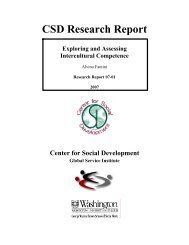Rediscovering social investment in developmental welfare state ...
Rediscovering social investment in developmental welfare state ...
Rediscovering social investment in developmental welfare state ...
Create successful ePaper yourself
Turn your PDF publications into a flip-book with our unique Google optimized e-Paper software.
R E D I S C O V E R I N G S O C I A L I N V E S T M E N T I N D E V E L O P M E N T A L W E L F A R E S T A T E P O L I C I E S :<br />
B A C K T O T H E F U T U R E<br />
In contrast, the f<strong>in</strong>d<strong>in</strong>gs us<strong>in</strong>g this approach suggest that poverty reduction may be able to be<br />
achieved by focus<strong>in</strong>g more resources on ALMP, family policies, or <strong>in</strong>-k<strong>in</strong>d policies that are universal,<br />
a set of policy reforms that may be achievable. While these analyses are simple and limited and<br />
should be corroborated with additional studies, if they hold, these f<strong>in</strong>d<strong>in</strong>gs suggest that <strong>in</strong> addition<br />
to overall expenditure effort, what happens with<strong>in</strong> expenditure and the way that different types of<br />
expenditures <strong>in</strong>teract may be quite important. While straightforward policy <strong>in</strong>ferences may still be<br />
difficult for some countries, this approach suggests some policies to consider.<br />
More broadly, and perhaps importantly, the <strong>developmental</strong>ist approach has the potential to help<br />
policymakers th<strong>in</strong>k <strong>in</strong> a more nuanced way about policy approaches and their <strong>in</strong>teraction. It suggests<br />
that <strong>social</strong> policy transfers are neither simply about consumption nor production but that transfers<br />
can entail both aspects simultaneously so that policy analyses and policy debates should not be<br />
carried out as if certa<strong>in</strong> transfers are only about passive distribution and consumption while others<br />
are about active <strong><strong>in</strong>vestment</strong>s. To the extent that <strong>in</strong>dividual policies do both synergistically and<br />
cumulatively, <strong>social</strong> expenditures cannot easily be rechanneled from passive to active <strong>social</strong> policies.<br />
The political economy tradition rem<strong>in</strong>ds us that the economic and <strong>social</strong> are often fundamentally<br />
<strong>in</strong>extricable, especially <strong>in</strong>sofar as a wide range of <strong>social</strong> conditions may have economic consequences.<br />
The notion that most <strong>welfare</strong> <strong>state</strong>s have components of all typologies <strong>in</strong> their system and that<br />
policy is neither solely protective nor productive (i.e., purely economic or <strong>social</strong>) suggests that it may<br />
be mislead<strong>in</strong>g to look for either an exclusively <strong>developmental</strong>ist regime or specific policies that are<br />
s<strong>in</strong>gularly <strong>developmental</strong>ist. Despite the difficulty of exam<strong>in</strong><strong>in</strong>g <strong>in</strong>teraction effects, it is clear that<br />
policies should not be evaluated <strong>in</strong> isolation from one another. While regime th<strong>in</strong>k<strong>in</strong>g risks<br />
obscur<strong>in</strong>g important policy details and limits the possibility of learn<strong>in</strong>g based on common metrics,<br />
very narrow cost-benefit analysis that attempts to hold all other policies constant could risk<br />
committ<strong>in</strong>g epistemological errors if there are <strong>in</strong> fact synergies associated with particular policy<br />
comb<strong>in</strong>ations. 61 Moreover, there are likely to be significant economic benefits to prevent<strong>in</strong>g poverty<br />
that we do not yet fully understand. While this analysis suggests that certa<strong>in</strong> <strong>social</strong> policies tend to<br />
simultaneously have both protective and productive effects, much more extensive and rigorous<br />
research will be necessary to confirm and expand on the tentative f<strong>in</strong>d<strong>in</strong>gs of this study.<br />
Second, <strong>in</strong> the larger study on which this paper is based, I acknowledged that there rema<strong>in</strong><br />
considerable challenges to crossnational research. In addition to data limitations, I argued that an<br />
even more formidable barrier to progress has been the lack of consensus on a conceptual framework<br />
for th<strong>in</strong>k<strong>in</strong>g comparatively about productive <strong>social</strong> policies across countries. The theoretical<br />
61 It is important to avoid committ<strong>in</strong>g errors, such as credit<strong>in</strong>g a particular policy for work<strong>in</strong>g when it is <strong>in</strong> fact a<br />
comb<strong>in</strong>ation of policies that are produc<strong>in</strong>g the desired result (type I), discredit<strong>in</strong>g a particular policy because<br />
supplemental policies that might contribute to its effectiveness are not be<strong>in</strong>g considered (type II), or mismeasur<strong>in</strong>g the<br />
effect of a program or <strong>in</strong>tervention that has been <strong>in</strong>completely implemented (type III). While Third Way-<strong>in</strong>spired<br />
research tends to emphasize a selective range of what it considers to be productive <strong>social</strong> policies, an <strong>in</strong>creas<strong>in</strong>gly<br />
important viewpo<strong>in</strong>t, what is referred to as the <strong>social</strong> <strong><strong>in</strong>vestment</strong> perspective (see contributions to Morel et al., 2012) has never<br />
achieved consensus (Jenson, 2009). Scholars work<strong>in</strong>g <strong>in</strong> this area should be careful not to assume that (1) <strong>in</strong>dividual<br />
policies can be considered as exclusively compensatory or <strong><strong>in</strong>vestment</strong>-oriented or (2) policies can be considered absent<br />
their potential <strong>in</strong>teractive effects. In other words, it is not straightforward to conclude that benefit generosity creates<br />
earn<strong>in</strong>gs dis<strong>in</strong>centives or to recommend employment-conditional earn<strong>in</strong>gs subsidies similar to the EITC (e.g.,<br />
Kenworthy, 2008). For <strong>in</strong>stance, to the extent that policies such as the EITC are associated with low wage, serviceoriented<br />
labor markets, the <strong>in</strong>troduction of such policies may erode generous <strong>welfare</strong> <strong>state</strong> benefits if it contributes to<br />
the expansion of low-wage labor markets with jobs that cannot susta<strong>in</strong> extensive taxes and transfers. It is critical to<br />
understand the complex impacts of exist<strong>in</strong>g policies and their preconditions.<br />
C E N T E R F O R S O C I A L D E V E L O P M E N T<br />
W A S H I N G T O N U N I V E R S I T Y I N S T . L O U I S<br />
43
















